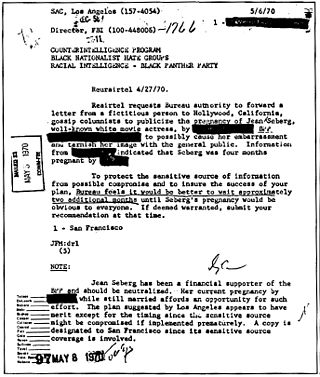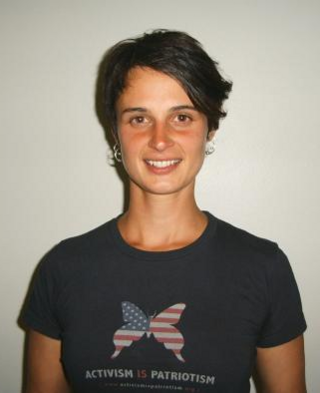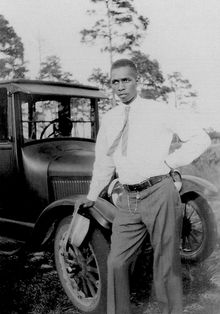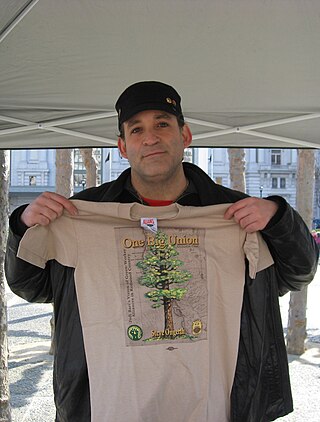
COINTELPRO was a series of covert and illegal projects conducted between 1956 and 1971 by the United States Federal Bureau of Investigation (FBI) aimed at surveilling, infiltrating, discrediting, and disrupting American political organizations that the FBI perceived as subversive. Groups and individuals targeted by the FBI included feminist organizations, the Communist Party USA, anti-Vietnam War organizers, activists in the civil rights and Black power movements, environmentalist and animal rights organizations, the American Indian Movement (AIM), Chicano and Mexican-American groups like the Brown Berets and the United Farm Workers, and independence movements. Although the program primarily focused on organizations that were part of the broader New Left, they also targeted white supremacist groups such as the Ku Klux Klan and the National States' Rights Party.

Judith Beatrice Bari was an American environmentalist, feminist, and labor leader, primarily active in Northern California after moving to the state in the mid-1970s. In the 1980s and 1990s, she was the principal organizer of Earth First! campaigns against logging in the ancient redwood forests of Mendocino County and related areas. She also organized Industrial Workers of the World Local 1 in an effort to bring together timber workers and environmentalists of Earth First! in common cause.

Earth First! is a radical environmental advocacy group that originated in the Southwestern United States. It was founded in 1980 by Dave Foreman, Mike Roselle, Howie Wolke, Bart Koehler, and Ron Kezar. Today there are Earth First groups around the world including ones in Australia, Belgium, Canada, the Czech Republic, France, Germany, India, Ireland, Italy, Mexico, the Netherlands, Nigeria, New Zealand, the Philippines, Poland, Slovakia, Spain, the United Kingdom, and the United States.

Tree spiking involves hammering a metal rod, nail or other material into a tree trunk, either inserting it at the base of the trunk where a logger might be expected to cut into the tree, or higher up where it would affect the sawmill later processing the wood. Contact with the spike often damages saw blades, which can result in injuries, or death, to nearby workers. The spike can also lower the commercial value of the wood by causing discoloration, reducing the economic viability of logging in the long term, without threatening the life of the tree. It is illegal in the United States, and has been described as a form of eco-terrorism.
Eco-terrorism is an act of violence which is committed in support of environmental causes, against people or property.
THERMCON was the code name of an FBI operation which was launched in response to the sabotage of the Arizona Snowbowl ski lift near Flagstaff, Arizona, in October 1987 by three people from Prescott, Arizona, Mark Davis, Margaret Millet and Marc Baker. In a November 1987 letter claiming responsibility, the group called themselves the "Evan Mecham Eco-Terrorist International Conspiracy" (EMETIC). The group named themselves after Evan Mecham, the then-Governor of Arizona. The Arizona Snowbowl spent $50,000 repairing the damage.

Julia Lorraine Hill, best known as Julia Butterfly Hill, is an American environmental activist and tax redirection advocate. She lived in a 200-foot (61 m)-tall, approximately 1,000-year-old California redwood tree for 738 days between December 10, 1997, and December 18, 1999. Hill lived in a tent near the top of a tree, affectionately known as Luna, to prevent Pacific Lumber Company loggers from cutting it down. She ultimately reached an agreement with the lumber company to save the tree. Hill is the author of the book The Legacy of Luna and co-author of One Makes the Difference.

Harry Tyson Moore was an African-American educator, a pioneer leader of the civil rights movement, founder of the first branch of the National Association for the Advancement of Colored People (NAACP) in Brevard County, Florida, and president of the state chapter of the NAACP.
The Pacific Lumber Company, officially abbreviated PALCO, and also commonly known as PL, was one of California's major logging and sawmill operations, located 28 miles (45 km) south of Eureka and 244 miles (393 km) north of San Francisco. Begun in 1863, PALCO was managed over most of the twentieth century by generations of the Simon J. Murphy, Sr. Family or managers chosen by the Murphys from 1905 through 1985. Primary operations existed in massive log storage and milling operations at the historic company town of Scotia, California, located adjacent to US 101 along the Eel River. Secondary mills were located in nearby Fortuna and Carlotta. PALCO had extensive timber holdings exceeding well over 200,000 acres (890 km²) in the Redwood and Douglas-Fir forests of Humboldt County. For generations, it was one of the largest private employers in the entire region, appropriately known as the Redwood Empire.

The Citizens' Commission to Investigate the FBI was an activist group operational in the US during the early 1970s. Their only known action was breaking into a two-man Media, Pennsylvania, office of the Federal Bureau of Investigation (FBI) and stealing over 1,000 classified documents. They then mailed these documents anonymously to several US newspapers to expose numerous illegal FBI operations which were infringing on the First Amendment rights of American citizens. Most news outlets initially refused to publish the information, saying it related to ongoing operations and that disclosure might have threatened the lives of agents or informants. However, The Washington Post, after affirming the veracity of the files which the Commission sent them, ran a front-page story on March 24, 1971, at which point other media organizations followed suit.

Stephen Henderson Talbot is a TV documentary producer, writer and reporter. Talbot directed and produced "The Movement and the 'Madman' " for the PBS series American Experience in 2023. He is a longtime contributor to the Public Broadcasting Service (PBS) and worked for over 16 years for the series Frontline.

William Patrick Staley is an American former professional football player who was a defensive end for five years in the American Football League (AFL) and National Football League (NFL). He played a total of 49 games, including two seasons with the Cincinnati Bengals and three with the Chicago Bears
Redwood Summer was a three-month movement in 1990 of environmental activism aimed at protecting old-growth redwood trees from logging by northern California timber companies and was part of the Timber Wars of the 1990s. Organized in 1990 by Earth First! and the Industrial Workers of the World, it was led by Judi Bari. A protest associated with Redwood Summer took place in June 1990 at the Louisiana Pacific export dock in Samoa, California. Before the protests officially started, the campaign gained international attention on May 24, 1990 when the campaign leader, Judi Bari, and a fellow activist, Darryl Cherney, were involved in a pipe bomb explosion that critically injured them while they were driving through Oakland, California. The explosion led to the FBI accusing Bari of manufacturing and transporting bombs. Due to the FBI not being able to adequately support their claims, she was eventually found innocent. The movement was also known to use many controversial techniques to disrupt the logging companies including tree spiking, symbolic protests, and disarming machinery. Though the protests were supposed to remain non-violent, many critics argue that Earth First! is a radical group and the techniques used in the protests are debated.
Kim Goldberg is an American-born journalist, poet and green party supporter who has lived in Canada since the 1970s.

Steve Ongerth is an American labor activist, environmentalist, political activist, and webmaster based in the San Francisco Bay Area. He served as writer and editor of One Big Union: Judi Bari’s Vision of Green-Worker Alliances in Redwood Country (2010).
David Nathan "Gypsy" Chain was an environmental activist. He was killed by a falling tree in suspicious circumstances during a protest in California Redwood Forests against the Pacific Lumber Company.
Josiah "Tink" Thompson is an American writer, retired professional private investigator, and former philosophy professor. In 1967, he published both The Lonely Labyrinth, a study of Kierkegaard's pseudonymous works, and Six Seconds in Dallas: A Micro-Study of the Kennedy Assassination. The culmination of his half-century-long Kennedy assassination project was published in early 2021 as Last Second in Dallas.

The history of Oakland, a city in the county of Alameda, California, can be traced back to the founding of a settlement by Horace Carpentier, Edson Adams, and Andrew Moon in the 19th century. The area now known as Oakland had seen human occupation for thousands of years, but significant growth in the settlements that are now incorporated into the city did not occur until the Industrial Revolution. Oakland was first incorporated as a town in 1852.

Who Bombed Judi Bari? is an American historical documentary about an assassination attempt on the life of Judi Bari, an American environmental and labor activist, which occurred on May 24, 1990 via a pipe bomb in her car. It was directed by Mary Liz Thomson and produced by Darryl Cherney. He is also an environmental activist and was traveling with Bari that day, but was not as severely wounded.

Greg King is an American journalist and environmental activist in Northern California. He is President and Executive Director of Siskiyou Land Conservancy, a non-profit land trust.













